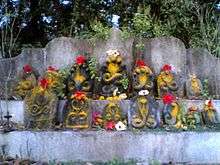Tulu people
The Tulu people or Tuluva people are an ethnic group native to Southern India. They are native speakers of the Tulu language and the region they traditionally inhabit is known as Tulu Nadu. This region comprises the districts of Dakshina Kannada , Udupi in Karnataka and parts of Kasaragod district of Kerala.[2][3] The Census report of 2011 reported a population of 1,846,427 native Tulu speakers living in India.[1]
| Total population | |
|---|---|
| c. 1.8 million | |
| Regions with significant populations | |
| 1,846,427 (2011 census)[1] | |
| Languages | |
| Tulu | |
| Religion | |
| Predominantly: Minorities: | |
| Related ethnic groups | |
| Dravidian · Kannadigas · Konkanis · Kodavas • Malayali • Tuluva Vellala | |
| Part of a series on the |
| History of Karnataka |
|---|
|
| Categories |
|
People and identity
Tulu speakers are divided into various castes. The major Tulu speaking castes are Shettigar / Padmashali, Mundalas, Mogeras, Bairas, Samagaras, Billavas, Sapaliga / Sapalya, Bunts, Mogaveeras, Kulala's, Devadiga's, Tulu Brahmins, Vishwakarmas and Nayak's etc. Mangalorean Protestants are also Tulu speakers.[4]
Culture


Tuluvas follow a matrilineal system of inheritance known as Aliyasantana, where inheritance is from uncle to nephew, except for Brahmins and Vishwakarmas.[5] Other distinctive features include the rituals of Yakshagana, Bhuta Kola, Nagaradhane[6] Aati kalenja and Kambala.[7]
Tuluva New Year is called Bisu parba, which falls on the same day as Baisakhi, Vishu and the Thai New Year.[8]
Tuluva Paddanas are sung narratives, which are part of several closely related singing traditions in Tulu language, Paddans are sung during occasions which describe the evolution of Tulu tribes and Tulu culture.[9]
Demand for Tulu Nadu
From India's independence and following the reorganization of states, the Tuluvas have been demanding national language status for Tulu[10] and a separate state for themselves called Tulu Nadu (Land of Tuluvas), based on their language and distinct culture. Though somewhat subdued for a while, this demand has grown stronger in recent years. Several organizations like the Tulu Rajya Horata Samiti have taken up the cause of the Tuluvas, and frequent meetings and demonstrations are held across towns in Tulunadu (such as Mangalore and Udupi) to voice their demands.[11][12][13]
Tuluva migration
During the 7th century AD, The Velir people from Tulu Nadu region were migrated to Thondaimandalam region of Northern Tamil Nadu. The prominent Chola King Karikala and his son Athondai Chakravarthy have settled these migrators at Thondaimandalam since they are great cultivators. Today, they are called as Thondaimandala Tuluva Vellala.(Thondaimandalam is the place of settlement and Tuluva is the place of origin.) [14]
Prominent Tuluvas
References
- "ABSTRACT OF SPEAKERS' STRENGTH OF LANGUAGES AND MOTHER TONGUES - 2011" (PDF). www.censusindia.gov.in. Indian Census 2011, Government of India. Retrieved 7 July 2018.
- "Tulu". ethnologue.com.
- "Tulu Nadu, Kasaragod, Kerala, India". Kerala Tourism. Retrieved 12 June 2017.
- Shetty, Malavika (2010). Telling Stories: Language, Narrative, and Social Life (Identity building through Narratives on a Tulu Call-in Show). Georgetown University Press. pp. 95–108. ISBN 9781589016743.
- Yogitha Shetty. "Ritualistic World of Tuluva: A Study of Tuluva Women and Siri possession cult". Retrieved 12 December 2010.
- "Nagapanchami Naadige Doodadu". Mangalorean.com. 18 August 2007. Retrieved 28 January 2008.
- "Connecting with nature". "Deccan Herald". 17 May 2010. Retrieved 20 May 2017.
- "Star of Mysore". Retrieved 26 July 2017.
- Peter J. Claus, "Variability in Tulu Padannas". Retrieved 2011-03-09.
- "Demand in RS for official status to Tulu, Kodava languages". dnaindia.com.
- Tulu Rajya Horata Samithi has urged that the region comprising Tulu speaking people should be given the status of a separate state."News headlines". daijiworld.com.
- "Now the time has come for all Tulu natives to pressurize the union government with the demand for a separate Tulunadu state”, said renowned Tulu litterateur and Yakshagana artiste Kudyady Vishwanath Rai."Beltangady: Litterateur Kudyady Vishwanath Rai Voices Need for Tulunadu State". daijiworld.com.
- "Vedike demands separate Tulunadu State". The Hindu.
- The Quarterly Journal of the Mythic people. Bangalore. pp. Volume 10. P. 252.
External links
| Wikimedia Commons has media related to Tulu people. |